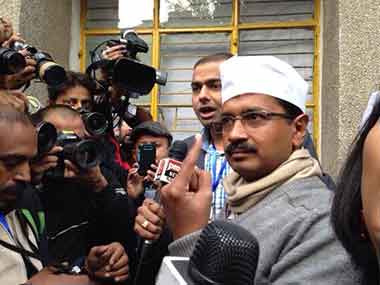In Mario Puzo’s Godfather, the protagonist says he will make an offer that cannot be refused. The exact words are, “I’m gonna make him an offer he can’t refuse”. It was a tactic he employed to run his empire. Guile, entrapment, brazen and violent confrontation were the ingredients. Now, Aam Aadmi Party’s Arvind Kejriwal has made an offer to both the Bharatiya Janata Party and the Congress an offer that they cannot accept. The two parties have been asked if they agreed with the content of his party’s manifesto. If they do, they get trapped. If they don’t, Delhi gets President’s Rule. The paradigm is different from what have been seen and believed are essential, even inescapable, aspects of politics. The wheeling, the dealing, treachery are so ingrained that it the country had event stopped frowning at them. The conditions come from the supporter. Here, it is the other way around. [caption id=“attachment_1287839” align=“alignleft” width=“380”]  Shruti Dhapola/Firstpost[/caption] Nothing in politics as we know is played straight. There are deals, and counter deals, and more importantly, ‘pretend deals’. Each political party assumes that the other can be tricked into accepting a pretend deal. In fact, they succeed sometimes, and sometimes don’t. The straight deals are normally confined to the privacy of the backrooms where amid the swirling smoke of intrigue and greed, the objectives are clearly set out and the material offers – money, positions, withdrawal of probes, et al are discussed threadbare. What is played out in the public domain often are the pretend deals, often shrouded in moral stances and sacrifice. The players speak of one thing and have entirely another in mind. Outguessing the rival or potential supporter is the key to a win or a loss. These have huge implications. All criticism of AAP’s reluctance to form a government, if they are from the ordinary people arises from the fact that it is being seen from the conventional prism: government formation by hook or crook. Actually the BJP and Congress are trying to build an image that AAP cannot be trusted. Can it be expected that the politicians from the two established, establishment parties, the Congress and the Bharatiya Janata Party would accept living ordinary lives when making laws and forgo the access to local area funds? The latter is misused by the venal – over-estimated costs, poor execution. The elected from the two parties would suddenly find that the first and quick means of recovering, at least partly, the expenses of contesting has evaporated. Kejriwal’s 18 points are going to be difficult for two parties to honestly address. It touches their conduct of the civic bodies or the state itself. Be it the irregular or patchy water supply despite adequate total stock or the power bills which AAP sees a consequence of state conniving with dishonest corporates. An audit of these which AAP proposes, along with a strong Janlokpal, could see a series of embarrassing exposes. When undertaking these tasks, it cannot be expected that the Congress with its “unconditional support” not waver and BJP, with its “constructive opposition” remain quiet. Politics has not been about values but high stakes in India where nearly three million persons, from parliament to village panchayats have made it a profitable business. It is all politician-centric and not people-oriented, the latter being only a pretext for furthering the politicians’ venal purposes. They cannot be expected to commit hara-kiri. It appears that Kejriwal is cleverly making a serious move to neutralise the campaign against the AAP as a party of novices reluctant to govern after making tall promises. He is obviously out to convince the electorate he may have to face in the next few months that government could not be formed because of Congress and BJP. It is not just the inadequacy of numbers that AAP has but also the insufficiency of voter preference which has brought about the stalemate. This too, from Kejriwal’s moves, is something that he is driving home to the voters. When they come seeking votes, the voters better support them in full measure. The two parties are shifting the blame on AAP which is only a runner up, not even the single largest party, by asking it to form a government. It is naïve to believe that BJP with 32 compared to AAP’s 28 is altruistic; its handicaps are the same as AAP’s. BJP does not want to break other parties; AAP in principle thinks it should not ever. By asking the two parties, both national in their sweep, both with a history of good, bad, indifferent or even poor governance to speak up on the issues that AAP wants to deal with, it has served what can simply be described as a masterstroke. It must have numbed the two.
All criticism of AAP’s reluctance to form a government, if they are from the ordinary people arises from the fact that it is being seen from the conventional prism: government formation by hook or crook.
Advertisement
End of Article
Written by Mahesh Vijapurkar
Mahesh Vijapurkar likes to take a worm’s eye-view of issues – that is, from the common man’s perspective. He was a journalist with The Indian Express and then The Hindu and now potters around with human development and urban issues. see more


)
)
)
)
)
)
)
)
)



